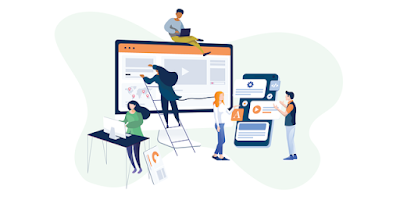The retail industry is one of the fastest growing industries that contributes to a country's economy. The sale of goods or services by a business to a consumer for their own use is known as retail. A retailer is a person or company from whom you buy goods. A retail transaction primarily deals with small quantities of goods. Wholesale, on the other hand, is concerned with the purchase of goods on a large scale. The retail industry is one of the fastest growing and is heavily influenced by customer demands. Retail stores face a slew of difficulties. Retail stores face a slew of issues that necessitate the use of ERP systems to address. As a result, an ERP for the Retail Industry is unavoidable.
ERP systems are pieces of software that integrate all of an organization's data and related business processes. Because of the high level of competition in the retail industry, it is beneficial to have an ERP software. They also necessitate capable systems and processes in order to achieve both short-term and long-term business objectives. The retail sector is made up of a number of sub-sectors, and effectively managing them is critical to increasing profits. ERP software makes use of a single database that allows various departments to communicate with one another. That is, ERP for the Retail Industry may be a viable option. Odoo ERP for Retail Industry is an excellent choice for increasing profit and productivity.
Odoo ERP for the Retail Sector
In the retail industry, sales management is a critical module. If you sell services or products and need an efficient way to manage your leads and customers, the sales management module is a must-have. Lead and customer data management, sales cycle management, email scheduling, quotation and invoice generation, and comprehensive sales reporting are among the features.
Point Of Sale
In the retail industry, point of sale has become extremely important. POS machines are essentially a system that organizes the transactions that take place in any retail establishment. It automatically feeds transaction details into the system using POS machines. It eliminates the need for extra effort as well as the possibility of human error. ERP tools are now integrated with POS machines, which is a major reason for real-time data. ERP expands on the advantages of POS machines. All transnational data are immediately reflected not only in the retail outlets, but also in the central ERP tool.
Purchase Management
- Procurement proposals should be automated.
- Send out a request for quotations.
- Keep track of purchase orders.
- Maintain information about suppliers.
- Control the reception of products.
- Examine the supplier's invoices.
Inventory Management
Because the retail industry, primarily consists of consumer goods, demand is highly volatile and dynamic. Inventory management is a critical issue in the retail industry. Excess inventory and an inability to meet demand can both result in financial loss. Inventory management is a standard feature of an ERP. It saves information about your entire inventory, including individual product details. This ensures that the inventory is accurate and that no items are about to run out of stock. It also monitors shelf life and alerts users when a product is about to expire.
ERP also has the ability to forecast demand. It is possible to forecast whether future demand will rise or fall by analyzing past trends and customer habits. It gives you an advantage by allowing you to adjust your inventory to meet demand.
Customer Relationship Management (CRM)
In retail, as in any other business, the customer is everything. Brand loyalty is like building a sandcastle on the beach, and there is always the risk of losing customers. Customer Relationship management and retention could benefit greatly from ERP in retail. As previously stated, ERP is based on information; information that, when analyzed, can be extremely valuable. For example, you can sort customers' purchase histories and select the most active ones to reward with reward points.
Customers who are satisfied with your services will allow you to create promotions and deals that are tailored to their specific needs. ERP, in addition to sales and marketing, assists you in resolving customer complaints in a timely manner. ERP provides a unified view of all customers and makes it available to all relevant departments in your company.
Human Resource Management System (HRMS)
The primary benefit of using ERP in the retail industry is employee management. The retail industry is comprised of retail outlets located in various geographical locations. Through an integrated system, ERP makes employee management easier. Most vendors include mobile solutions with their ERP packages, making employee management easier. The ERP system stores critical employee information, as well as real-time information such as shift timings, work hours, and so on. All of this contributes to more efficient employee management and easier communication with them.
Accounting Management
Accounting Management is one of the most important ERP for any industry. Billing management, asset and depreciation management, tax management, invoice management, financial analysis reports, currency management, and so on are all part of the accounting management module.
Ecommerce
Ecommerce has complete control over the future of the business and its growth. Retailers can increase their sales by allowing customers to choose their products on their smartphones and tablets and giving them, the convenience of shopping on the go through channels of customer preference. Retailers can immediately begin their online business and accept credit card payments. Ecommerce has accelerated the growth of the business to a new level.
Via Ref Link : https://www.geminatecs.com/blog/erp-for-retail-management-at-geminatecs



No comments:
Post a Comment